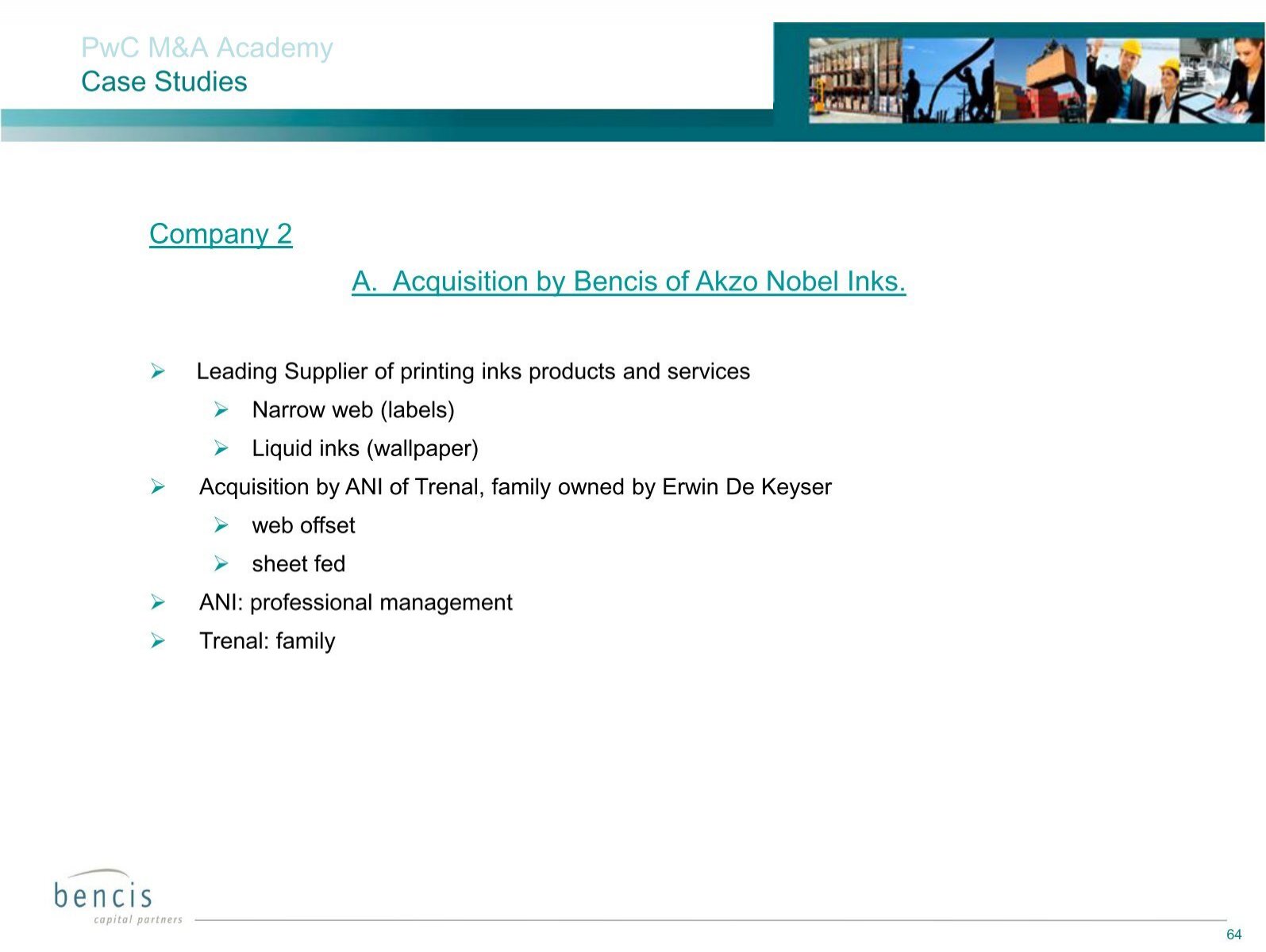Understanding PwC's Decision To Leave Nine African Markets

Table of Contents
PwC's Rationale for Market Exit
PwC's official statements surrounding its decision to leave these nine African markets haven't explicitly detailed specific reasons. However, analyzing the firm's global strategy and the realities of operating in certain African nations reveals several potential contributing factors. The driving force appears to be a strategic recalibration focused on profitability and return on investment. This involves a complex interplay of financial considerations. Several key factors likely influenced this decision:
-
Decreased profitability in specific markets: Some markets may simply not have yielded the expected financial returns, leading to a decision to consolidate resources in more lucrative areas. This is a common strategy for multinational corporations looking to maximize their overall global profitability. Understanding PwC's financial performance in these individual markets is crucial.
-
High operational costs in certain African countries: Challenges such as infrastructure limitations, regulatory hurdles, and fluctuating currency exchange rates can significantly increase operational costs in certain African countries, making them less attractive compared to other markets. This relates directly to the "cost reduction strategy" employed by PwC.
-
Focus on more lucrative markets: PwC is likely prioritizing markets offering higher growth potential and better profit margins. This is a typical business strategy aiming for optimized "market profitability Africa."
-
Consolidation of resources: By withdrawing from less profitable markets, PwC can reinvest its resources into areas with greater potential for growth and return on investment. This allows for a more efficient allocation of capital and expertise.
This "PwC financial performance" review likely played a significant role in the strategic decision-making process.
Impact on the Affected African Markets
PwC's withdrawal from nine African markets will undoubtedly have significant implications for the local business landscape. The immediate effect will likely be felt by local businesses that relied on PwC for auditing, consulting, and other professional services.
-
Job losses in the affected markets: The departure of a major player like PwC will inevitably result in job losses for both PwC employees and potentially those within associated businesses. This is a critical aspect of the "PwC impact Africa."
-
Challenges for local businesses seeking new audit firms: Local businesses will now need to find alternative auditing and consulting services, a process that could involve significant disruption and increased costs. This highlights the need for robust alternative "audit services Africa."
-
Potential impact on investor confidence: The withdrawal of a prominent international firm might negatively impact investor confidence in the affected markets. This "African economic impact" requires careful analysis.
-
Need for alternative accounting and consulting solutions: The void left by PwC needs to be addressed with the development of local capacity and the attraction of other international firms. This emphasizes the importance of fostering robust alternative accounting and consulting solutions.
The "business implications" are far-reaching and need to be thoroughly assessed by both government and business leaders in the affected countries.
PwC's Future Strategy in Africa
Despite the withdrawal from nine markets, PwC remains committed to its presence in Africa. The company's future strategy likely involves a more focused approach, concentrating on key markets with high growth potential.
-
Focus on key strategic markets in Africa: PwC will likely prioritize markets with robust economies, stable political environments, and promising long-term growth prospects. This reflects a more targeted approach to "Africa market growth."
-
Investment in technology and digital solutions: PwC is likely to invest heavily in technology and digital solutions to enhance efficiency and service delivery in its remaining African markets.
-
Strengthening partnerships with other firms: Strategic alliances and partnerships with local firms could enhance PwC's reach and expertise within the remaining African markets. This aspect of "strategic partnerships Africa" is essential for success.
-
Commitment to long-term growth in Africa: PwC's long-term commitment to Africa remains, albeit with a revised, more strategic approach. This "PwC Africa strategy" emphasizes sustainable growth.
This adjusted "future of PwC Africa" signifies a shift towards a more targeted and efficient operational model.
Comparison with Other Global Accounting Firms' Strategies in Africa
PwC's decision to withdraw from certain African markets requires a comparative analysis with the strategies adopted by other Big Four accounting firms (Deloitte, EY, and KPMG) operating in Africa. Each firm's approach is shaped by its individual assessment of risk and reward.
-
Market share analysis of Big Four firms in Africa: A comprehensive analysis of market share among the Big Four firms is crucial to understand the competitive landscape.
-
Different strategies adopted by competing firms: Each firm adopts a unique approach based on its resources, risk tolerance, and long-term vision for the African market.
-
Impact of global economic conditions on the African market: Global economic fluctuations and geopolitical events significantly influence the strategies of these firms operating in Africa.
This "competitive landscape" analysis reveals how individual firms within the "Big Four Africa" navigate this complex environment. Further research into "Deloitte Africa," "EY Africa," and "KPMG Africa" strategies is recommended.
Conclusion
PwC's decision to leave nine African markets is a complex issue driven by a combination of financial factors, operational challenges, and a strategic shift towards higher-growth markets. Understanding PwC's decision reveals insights into the complexities of operating in the African business environment and the evolving strategies of major global accounting firms. This move has significant implications for the affected African economies and the overall landscape of the "accounting firms Africa." The need for further analysis of PwC's Africa strategy and the long-term impact of its withdrawal is essential for all stakeholders. Stay informed about developments in the African business landscape and the strategies of major global accounting firms to gain a deeper understanding of the dynamics at play. Further analysis of the "impact of PwC's withdrawal" is encouraged.

Featured Posts
-
 Brazil Bound Justin Herbert And The Chargers 2025 Season Opener
Apr 29, 2025
Brazil Bound Justin Herbert And The Chargers 2025 Season Opener
Apr 29, 2025 -
 Fox News Faces Defamation Lawsuit From Ray Epps Over January 6th Reporting
Apr 29, 2025
Fox News Faces Defamation Lawsuit From Ray Epps Over January 6th Reporting
Apr 29, 2025 -
 Where To Invest A Map Of Promising Business Locations In The Country
Apr 29, 2025
Where To Invest A Map Of Promising Business Locations In The Country
Apr 29, 2025 -
 Temu Price Hikes The Hidden Cost Of Trump Era Tariffs For Us Consumers
Apr 29, 2025
Temu Price Hikes The Hidden Cost Of Trump Era Tariffs For Us Consumers
Apr 29, 2025 -
 Porsche Cayenne 2025 High Resolution Images Of Interior And Exterior Features
Apr 29, 2025
Porsche Cayenne 2025 High Resolution Images Of Interior And Exterior Features
Apr 29, 2025
Latest Posts
-
 The Challenges Of Growing Up On Our Yorkshire Farm Reuben Owens Perspective
Apr 30, 2025
The Challenges Of Growing Up On Our Yorkshire Farm Reuben Owens Perspective
Apr 30, 2025 -
 Our Yorkshire Farm Reuben Owen Opens Up About His Childhood Struggles
Apr 30, 2025
Our Yorkshire Farm Reuben Owen Opens Up About His Childhood Struggles
Apr 30, 2025 -
 Our Yorkshire Farm Channel 4 Announcement Sparks Further Complaints Against Amanda Owen
Apr 30, 2025
Our Yorkshire Farm Channel 4 Announcement Sparks Further Complaints Against Amanda Owen
Apr 30, 2025 -
 Amanda Owen Raising 9 Children On Our Farm Next Door
Apr 30, 2025
Amanda Owen Raising 9 Children On Our Farm Next Door
Apr 30, 2025 -
 Our Farm Next Doors Amanda Owen Family Photos And Rural Life
Apr 30, 2025
Our Farm Next Doors Amanda Owen Family Photos And Rural Life
Apr 30, 2025
